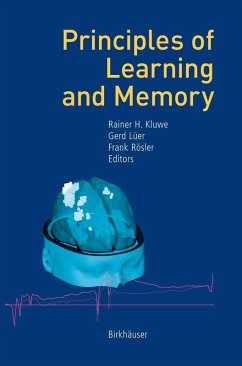Principles of Learning and Memory focuses on the most actual and central phenomena, which are discussed from an interdisciplinary point of view in five sections: formation, organization, consolidation, control, and adaptive specialization of memories. The editors' intention is to present state-of-the-art reviews that cover the experimental analysis of behavior, as well as the biological basis of learning and memory, and that overcome traditional borders separating disciplines. The authors met in March 2001 for a three-day conference, where they discussed their planned contributions. The resulting chapters present and evaluate core findings of human learning and memory that are obtained in different fields of research and on different levels of analysis (e.g., cellular, neural network, behavioral level). The volume provides an integrated pattern of results wherever this is possible. The reader will acquire a broad and integrated perspective of human learning and memory based on current approaches in this domain.
Principles of Learning and Memory is a textbook for researchers and advanced students in biology, cognitive psychology, neuroscience, and cognitive science.
Features and benefits:
- Combines well-established central principles and phenomena and current approaches from cognitive science, neuroscience, and biology to emphasize connections between the findings in these different domains of research
- Takes into account results from empirical research and modeling approaches
- The contents are grouped into five sections:
A. Formation of Memories
B. Organization of Memories
C. Consolidation of Memories
D. Control of Memories
E. Adaptive Specialization of Memories
- Contains an integrated bibliography, a name index, and a subject index
- The editors and authors are well known scientists, who have made significantcontributions to the field of learning and memory
Principles of Learning and Memory is a textbook for researchers and advanced students in biology, cognitive psychology, neuroscience, and cognitive science.
Features and benefits:
- Combines well-established central principles and phenomena and current approaches from cognitive science, neuroscience, and biology to emphasize connections between the findings in these different domains of research
- Takes into account results from empirical research and modeling approaches
- The contents are grouped into five sections:
A. Formation of Memories
B. Organization of Memories
C. Consolidation of Memories
D. Control of Memories
E. Adaptive Specialization of Memories
- Contains an integrated bibliography, a name index, and a subject index
- The editors and authors are well known scientists, who have made significantcontributions to the field of learning and memory
Dieser Download kann aus rechtlichen Gründen nur mit Rechnungsadresse in A, B, BG, CY, CZ, D, DK, EW, E, FIN, F, GR, HR, H, IRL, I, LT, L, LR, M, NL, PL, P, R, S, SLO, SK ausgeliefert werden.


